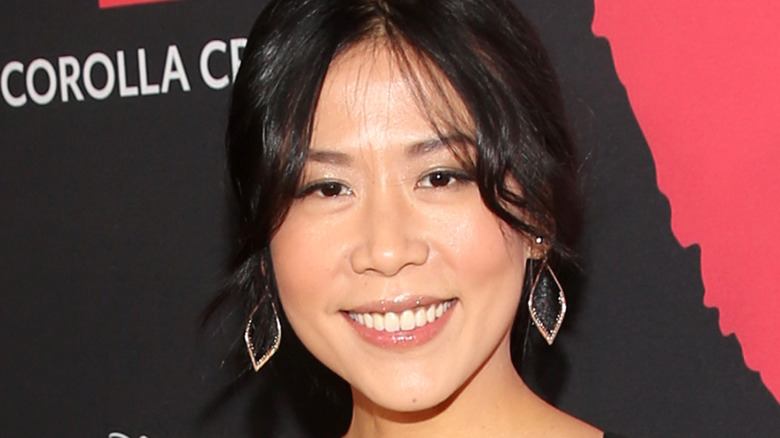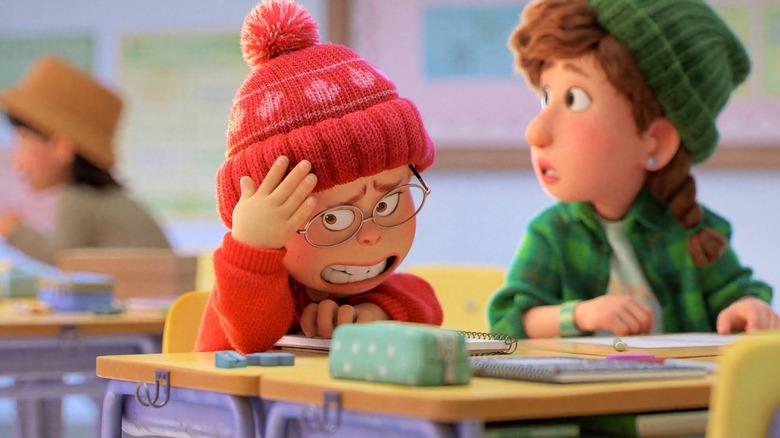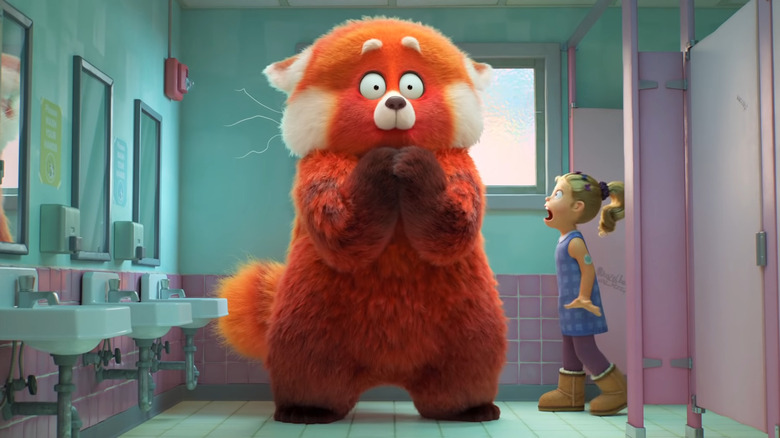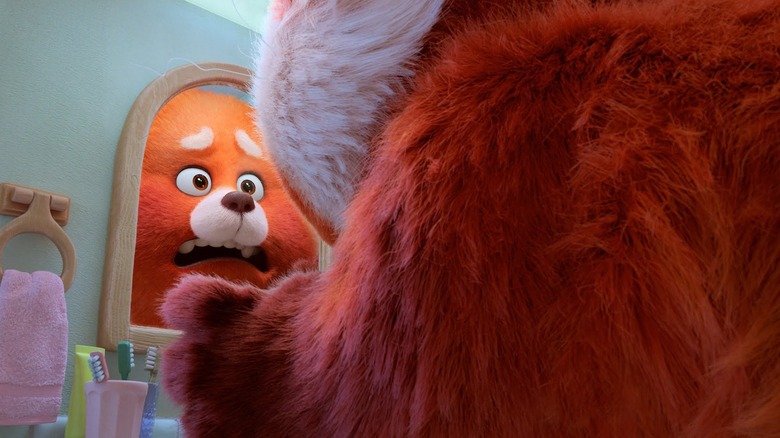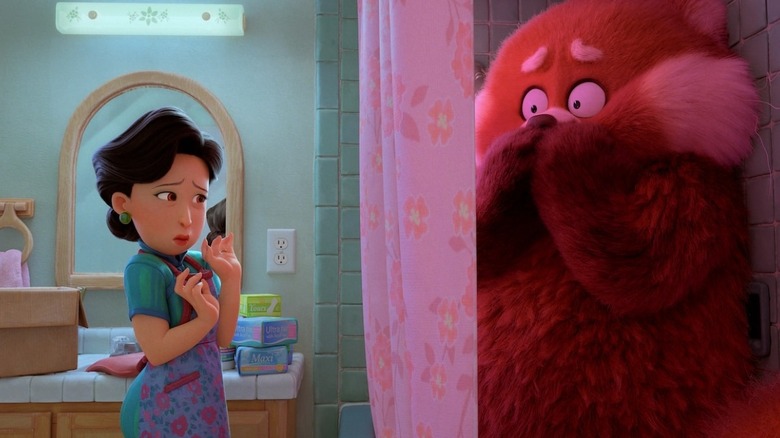Domee Shi And Lindsey Collins Discuss Creating A Larger-Than-Life Adventure With Turning Red - Exclusive Interview
This interview contains minor spoilers for "Turning Red."
"Turning Red" is the latest adventure to come out of the minds at Pixar. The newest animated offering focuses on Mei Lee (Rosalie Chiang), a young teen who one day wakes up with the ability to transform into a giant red panda whenever she gets too emotional. She'll go on a journey of self-discovery to find out who she truly is and who she wants to be.
It's a tale unlike anything that's come out of the animation studio in the past, focusing specifically on coming of age in the modern world as a young woman. Leading the charge behind the scenes are some incredibly talented women who helped bring "Turning Red" to life. First, there's the director and co-screenwriter Domee Shi in her feature-length directorial debut. Prior to "Turning Red," Shi was best known for writing and directing the Oscar-winning Pixar short, "Bao."
There's also producer Lindsey Collins. Looper had the chance to chat with both of these amazing women to learn more about "Turning Red," including whether Pixar or Disney pushed back on any of the more risqué elements of the film.
On becoming red pandas themselves
The first question I have is for both of you. If you could turn into a giant red panda, what's the first thing you would do?
Lindsey Collins: Oh gosh, that's hard.
Domee Shi: Oh man. I'd raid a Tim Hortons and eat all the donuts.
Collins: You'd go rob a Tim Hortons or would you actually pay for it? No, you'd go in and take it.
Shi: No, no, I'd go in and I'd take it and I'd be like, "This is free advertising for you guys!"
Collins: You'd offer yourself up to advertise and get free stuff.
Shi: Yes, exactly.
Collins: There is something to the hustle that I actually like. That's one of my favorite scenes [in "Turning Red"] when she has a moment of, "Wait a minute ... I could actually make money off of this thing." I think there's something real about [the fact that this] is the first thing you think of or, "How could I monetize this?" Or get free donuts, depending on how you think about it. I like that answer.
I also love the fact that she does have these ... I would be poofing all over the place. I'd be in, out, in, out. I think the poofing is so funny and trying to play around.
Shi: [It] launches you up like a rocket.
Collins: Yeah, it's funny.
The morphing of Turning Red
Domee, this is your feature film, [and your] directorial debut. Can you talk about any challenges or obstacles going from short films to feature-length?
Shi: Yeah, the scale of a feature film is so much bigger and more daunting than a short, and the fact that it takes so much longer to make a feature than a short. For me, specifically, I'm naturally a type-A, perfectionist kind of a person and an artist, so it took a while for me to get used to working rough and fast and living with a broken movie for a long period of time.
We have eight screenings throughout the course of production, so it's eight chances to improve and make the movie the best it can be, but in those eight screenings, it's still in this primordial state, and it's slowly morphing into something that's good. It took a lot of will power and mental retraining to show work that was unfinished for me.
Was there any morphing that took place from the beginning of "Turning Red" to the finished product, like early ideas that were eventually scrapped for whatever reason?
Collins: Oh, yeah. So many.
Shi: So many.
Collins: I think that was one of the things that was really impressive about Domee, and unique, is that because we screen these things so often, the process is always different in terms of how the movie comes together. For Domee, every screening was a pretty radical departure. There [were] big changes being made, and you could feel it in the sense that people were always nervous that we were making big changes because they were afraid we were going to lose the thing that they loved about the movie, which was this humor and voice and tone.
It's so easy to lose that in the mix, as you're trying to shuffle everything around and evolve everything. Every version of it, I would say, it didn't lose that, ever, but we made massive changes. Ming, her mom, didn't turn into a panda in the very first version of the movie. That Ming was the one that was trying to monetize the panda.
Shi: Yeah, it was a completely different story.
Collins: There's a cousin who we eventually turned into Tyler, who is also a panda, who also turned into a panda.
Shi: Yeah. It got simpler and more focused on the theme of puberty and dealing with growing up and all of those bells and whistles got cut away.
On making a magical puberty movie
Was there any pushback from Pixar or Disney about any of the material or themes discussed in the film?
Collins: No.
Shi: No.
Collins: The pitch was always about magical puberty, and they also knew Domee from "Bao." That's the benefit and the curse of working at Pixar, is that everybody knows you. It's not like you can come in and hide in your directorial debut. Everybody's like, "Okay, we know what we're getting with Domee."
I don't think there was any delusion that she was going to tell a pretty tame and right-down-the-middle story of puberty. As a result, we put it all in there. Granted, all the specifics were different, but the intention and the boldness was in there in the very first screening.
It gave everybody the opportunity to do a gut check. There were some that were like, "Hold on, you can't say that." Or there was little specific stuff, but in terms of the bigger kind of intent, there was never hold-back.
Shi: Yeah, because all of that related to the story we were trying to tell, like all of those risqué elements, the pads ... Yeah. Puberty, all that stuff —
Collins: Crushing on the boys —
Shi: Crushing on the boys is like ... All of that was so necessary in telling the story about this girl who was coming of age.
The casting process
How did the casting process go? Was it difficult to find the voice of Mei or Ming Lee at any point?
Shi: Mei was deceptively easy —
Collins: Mei was easy.
Shi: – because we lucked out in the sense that we cast Rosalie as this temporary voice. We were like, "There's a lot less pressure on that." We're like, "Yep, we need somebody who's that age who can act and who can come in and do a bunch of stuff that we're going to end up replacing."
But it allowed us to really work with her ... all of a sudden, we weren't able to even separate Rosalie from Mei. There was no question when we were going to actually cast it, that it was going to be her.
Collins: Yeah. And then for Sandra [Oh], we've been huge fans of her since forever, like "Sideways" and "Grey's Anatomy" and "Killing Eve." We knew that we needed an actress who had incredible range because Ming is such a complex character who could so easily go into one-note arch villainous territory. We needed an actress like Sandra who could be sharp, who could be scary, but who could also be loving and warm and funny and kooky all in one scene. That was her ... There was only her.
Shi: We were lucky. Our writer [Julia Cho] and Sandra had worked together before. We were like, "Can you text her and have her take the meeting with us?" It was love at first sight. She came in, and we pitched her the movie. She totally got it. She was super like, "Oh yeah, this is my experience with my mom, and I love this."
"Turning Red" premieres exclusively on Disney+ on March 11.
